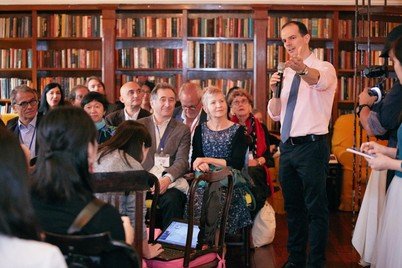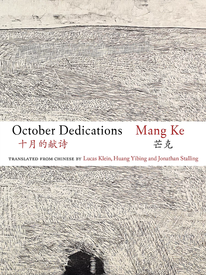Poetry in Translation: Bringing Chinese Poetry to English-speaking Audiences
We are changing the reputation that Hong Kong has as a centre of culture, and of how poets and writers think of Hong Kong.
Many highly-regarded works of Chinese poetry would remain unknown to the English-speaking world without the skill and dedication of diligent translators. One of these is Dr Lucas Klein of the School of Chinese, whose translations have given international audiences access to the world of classical and contemporary Chinese poetry.
Dr Klein was most recently recognised for his book “October Dedications: Selected Poems of Mang Ke”, featuring translations of the poetry of Mang Ke. The book has been shortlisted for the 2019 Lucien Stryk Asian Translation Prize. The poems have been described as a challenge to translate, with Dr Klein’s translations applauded for their “startling clarity”.
Accolades for other works include his translation “Notes on the Mosquito: Selected Poems of Xi Chuan”, which won the Lucien Stryk prize in 2013 and was shortlisted for the Best Translated Book Award in poetry, and his translations of late Tang dynasty poet Li Shangyin, published by New York Review Books in 2018. He also published the academic monograph “The Organization of Distance: Poetry, Translation, Chineseness” in 2018.
As co-translator of “Endure”, published in 2011, Dr Klein’s work brought attention to contemporary Chinese poet Bei Dao, founder of International Poetry Nights in Hong Kong, a poetry festival featuring international and Chinese poets.
Dr Klein has just completed work on a collection of poems by contemporary Chinese poet Duo Duo, to be published by Yale University Press including about 100 poems written in the last 15 years, which will now be accessible for the first time to non-Chinese speakers. “Nothing he’s written since 2002 has been available in English,” he said. He anticipates that the book will bring the poet – a Beijing resident with a strong following in China – back onto the international radar.
He recently published some translations of Duo Duo’s in Cha: An Asian Literary Journal, a free-to-access English-language literary journal where he frequently contributes.
He works extensively with other poets and translators, which he believes they improve his work. “I want other people to read it; you make mistakes,” he explained. “I look for Chinese speakers who can give feedback, friends and other translators.”
Dr Klein started studying Chinese at age 16. He grew up in Chicago and studied for a term in Beijing in 1995 and one in Taiwan. He graduated in Chinese and literary studies in 2000. Over time, his focus changed from philosophy to poetry. “I realised translation was the highest level of language work and became interested in it,” he said.
After spending time in Beijing and Paris, he moved to Hong Kong in 2010, a time when the city had few poetry-based activities. Now there is a sizeable community of Chinese to English translators around the world and Dr Klein said Hong Kong had been a home to several regular poetry and translation events, mentioning poetry nights organised by Bei Dao and poetry reading sessions organised by Ms Tammy Ho, Cha’s co-founding editor. These are the reasons Hong Kong has become a hub of poetry and translation, which he believes has helped to broaden people’s perceptions of the city.
“I hope I’ve contributed to that,” he added. “We are changing the reputation that Hong Kong has [as a centre of culture], and of how poets and writers think of Hong Kong.”



![Dr Lucas Klein moderating the China – India Writers’ Dialogues at HKU in October 2018 [photo credit: Zhai Yongming]](/f/story/1056/402p275/KLEIN%20headshot%20Dialogues.jpg)
